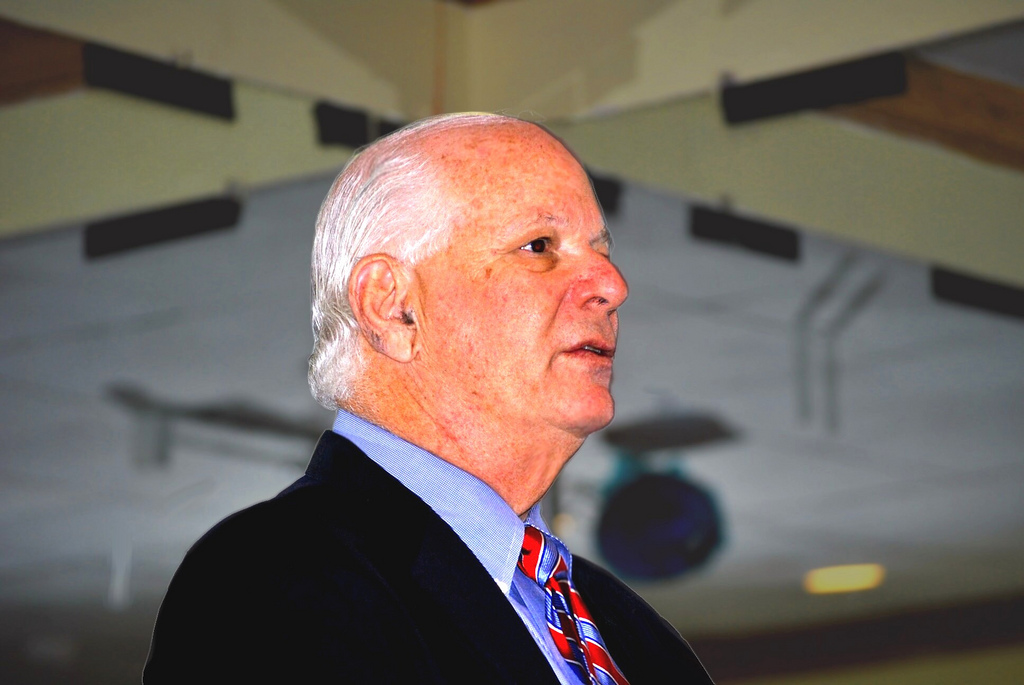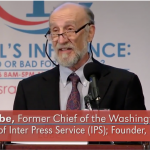by Ali Gharib
With the self-imposed deadline for Iran nuclear talks looming, obstacles to reaching a deal are emerging mostly from the Iranian side. The majles, or parliament, passed a bill seeking to restrain inspections on Iranian soil. More importantly, Ayatollah Ali Khamenei, Iran’s supreme leader who has final word on all matters of state, laid out onerous conditions for a deal that, if he holds to his red lines, would make an accord difficult for world powers to agree to.
American hardliners aren’t done yet either. Though they’re fighting from the outside—contrasted with Khamenei, who controls whether Iran inks a deal—the hardliners have launched a vigorous campaign against an accord. There are reports of massive ad buys, totaling millions of dollars, and activism by the powerful pro-Israel lobby flagship, the American Israel Public Affairs Committee (AIPAC), against the emerging deal.
One of the U.S. campaigns caught my eye. The shady anti-diplomacy group United Against a Nuclear Iran (UANI) launched an ad claiming that “the concessions go too far.” It then immediately cites a Washington Post editorial complaining that “Iran’s nuclear infrastructure will remain intact,” before moving on to the next point. (The copy introducing the ad on the website also says, “The deal leaves much of Iran’s enrichment infrastructure intact.”)
This harkens back to an old demand of critics of diplomacy: that Iran eliminate its domestic nuclear enrichment entirely. The “zero enrichment” position has long been considered unrealistic. Indeed, neither side seriously considered this position going into the negotiations that yielded the November 2013 interim deal and the April 2015 framework.
Many hawks held firm for a long time—and a lot of people who pushed “zero enrichment” are hawks—but they’ve started to fall off little by little. One of the loudest and most influential advocates of “zero enrichment” seems to have softened his line in 2015: Israeli Prime Minister Benjamin Netanyahu. Netanyahu’s aides told The New York Times after his controversial congressional speech earlier this year that, despite having made incessant and strongly worded calls for “zero enrichment” in the past, the demand was intentionally left out his remarks on the Hill.
One can also make a purportedly concrete demand and still sound ambiguous notes throughout. Take AIPAC’s five requirements (why always five points?) of a final nuclear deal. The fifth demand veers dangerously close to calling for “zero enrichment”: “A good deal must require Iran to dismantle its nuclear infrastructure and relinquish its uranium stockpile such that it has neither a uranium nor plutonium pathway to nuclear weapons.” Everything after “such that” could be considered a qualifier. But does AIPAC think that any amount of domestic enrichment means a “pathway” to a bomb? That’s unclear.
An Unpopular Position
Nevertheless, the “zero enrichment” demand has always been a non-starter; foreign policy and nuclear policy experts alike agree on this. And if a recent poll is any indication, so do the American people. The Washington Post (whose hawkish editorial board, remember, laments Iran’s remaining nuclear infrastructure) reports:
When voters from politically divergent states of Oklahoma (very red), Virginia (swing) and Maryland (very blue) are given the same information about the Iran deal, the vast majority in each state support the same position.
More than seven in 10 registered voters in each state said the U.S. should pursue a deal allowing Iran to enrich some uranium, according to the surveys by the non-partisan Program on Public Consultation (PPC). A quarter or fewer supported increasing sanctions to push Iran to end its program entirely. Even within each state, clear majorities of Republicans and Democrats came down in favor of a deal allowing Iran to have a peaceful nuclear program rather than demanding a complete end to nuclear enrichment.
The numbers are really something. Last summer, Jim Lobe wrote about a poll where about six in 10 respondents favored a deal along the lines that would allow Iran to maintain some enrichment under rigorous inspections. Other recent polls placed the number of those willing to accept such a deal at a small majority.
Pressure on Cardin
Perhaps the most important result of the PPC poll comes from Maryland, the home of Democratic Senator Ben Cardin, who took over the ranking member role on the Senate Foreign Relations Committee after the staunch Iran hawk Bob Menendez’s (D-NJ) indictment. In the past, Cardin has joined with hawkish colleagues to press a “zero enrichment” line. But more recently Cardin seems to have dropped that demand, with public opinion likely playing some role in that shift. The senator also played a role in crafting a compromise on the recent bill that gave Congress authority to review an Iran nuke deal. Though still potentially risky, the compromise stripped out enough of the original bill’s destructive provisions that the White House came to reluctantly support it.
Cardin has historically been close to pro-Israel groups like AIPAC, and his support for a deal is far from assured. That’s one of the reasons he’s being targeted by a big ad buy from the American Security Initiative (ASI), a group formed by, among others, former Sen. Joe Lieberman (I-CT). The ASI is probably best known for a previous ad campaign rightly described as “hilariously over-the-top fear-mongering.”
Consider the source of this ad: the über-hawk Lieberman, who’s recently been palling around with the ex-terrorists of the Mojahedin-e Khalq. That alone is enough not to take him and his affiliated groups seriously at all. And that’s what Cardin should do: ignore these pressure groups and listen to his constituents.
It’s crunch time and members of Congress should position themselves so that, if negotiations don’t result in a deal, it can be clearly blamed on the Iranian hard-liners’ overreach. In this regard, “zero enrichment” positions can play a clarifying role. If someone is for them, it probably means they don’t want any deal at all. In fact, they probably favor a disastrous war. It’s a good thing that there are fewer such advocates out there. But that doesn’t mean that we should ignore the dead-enders that are left still making unreasonable demands.
Photo: Benjamin Cardin






A little bit of false argument here since the American bargaining position has evolved to drop the zero enrichment position and move towards pushing the “breakout” period to only one measly year, but even that huge concession wasn’t enough for Khamenei when he called for leaving Iran’s enrichment capacity intact and removing military sites and scientists from inspection protocols. The US has made some really huge concessions and all they’ve gotten back is Khamenei digging his heels in even deeper. If he really wants a deal, he better learn how to bargain because his current approach is a sure way to kill a deal, unless of course he’s not really interested in a final deal and just wants to drag this whole process out longer while Iran keeps itself busy with three proxy wars in Syria, Iraq and Yemen. What’s next? Somalia? Afghanistan? Nigeria?
Mr. Gharib, why will no nuclear deal with Iran lead to a “disastrous war”? A few well placed bunker busters can do the job.
Iran is not Saadam Hussein who by invading Kuwait potentially threatened world oil supply and by further provoking the west by allegedly maintaining weapon’s of mass destruction.
The leaders Iran are motivated by fanatical Islam, and no doubt left unopposed will continue to terrorize others who believe differently. But they are not meglo-maniacs as Saadam was, nor will they frontally engage a strong western power(s).
But in any case radical ideology cannot be rationally dealt with. Unless the deal with Iran allows unlimited inspections, it isn’t worth the paper its written on.
@ Barbara C.
1-The poll result would have been quite different had there been a sincere dissemination of information. Let’s not forget these polls were conducted after decads of successful Western and Zionist media ‘demonization’ of Iranians as anti-Semites warmongers, especially the ‘deliberately’ mistranslated ‘Israel off the map’ motto used by the Zionist regime!
2-What you call “concession” is in fact a ‘false’ gesture; not just because in the first place a nuclear weapon America with legacies of war crimes had no right to call for ‘no enrichment’ position, but that in their negotiations as a part of the Zionist tactics it is always essential to demand ‘too much’ in the first place in order to later drop some of the unreasonable demand (what you call ‘concession’!) in order to force their opponant to eventually after frustration (following that false concession) to agree to something less demanded by the Zionists, which is still an unreasonable demand in itself; hence the tactic behind the US “huge concession” or the “evolving” of “‘no enrichment’ position”! It was all nonsense!
3-And what gives the US/Israel the right to inspect Iran’s military sites and its scientists?! Has any countries in the wholrd been given the right to inspect the military sites and scientists in the US, or in Israel or Russia or China, Pakistan, India, Britain? Despite the fact that all these countries have nuclear weapons and repeatedly committed shocking crimes against humanity! It is astonishing how the Western public introject an arrogant colonial view of the Middle East that their pro Zionist/Imperialist media feeds them, and then unconsciously they project it on these nations! Another example is your comment on Iran’s proxy wars: please do some research on Yemen before calling the Western meddling and direct support for the Saudi’s war crimes in Yemen an ‘Iranian’ proxy war! Please read Yemen’s history, e.g. in Wikipedia; the same with the decades of conflict in Iraq, and the Western “huge concessions”.